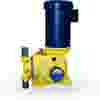There are two main types of process pumps: centrifugal pumps and reciprocating pumps. Both are used in oil and gas processes, refineries, the petrochemical industry, and chemical processes.
The technologies associated with process pumps are generally designed for handling any kind of fluids, but also aggressive chemical fluids.
What Are API Process Pumps?
API stands for the American Petroleum Institute which is the largest U.S. trade association for the oil and natural gas industries. It focuses on developing petroleum and petrochemical equipment and operating standards including all pump technologies.
The API has developed over 700 standards to improve safety, environmental protection, and sustainability in the oil and gas industry. These standards are adopted by many countries around the world.
Milton Roy offers a comprehensive pump range which fully complies to API 674 and API 675 standard.
- API 674: Positive Displacement Pumps—Reciprocating
- Piston pump / Plunger pump
- Power pump : a reciprocating pump consisting of a power end and a liquid end connected by a frame. The power end of a power pump uses a crankshaft, connecting rods, and crossheads to transfer energy from a rotating shaft to pistons or plungers. The liquid end of a power pump consists of cylinders, pistons or plungers, and check valves.
- API 675: Positive Displacement Pumps— Controlled Volume for Petroleum, Chemical, and Gas Industry Services
- Packed plunger
- PTFE diaphragm
- Metallic diaphragm
The major advantages of API 675 pumps are:
- To self-protect the pump and increase its reliability:
- An integrated adjustable hydraulic pressure relief valve fully protects the drive mechanism from excessive discharge pressure.
- An internal MARS pilot valve automatically controls the refill of the hydraulic oil.
- The double diaphragm combined with a rupture detection system provides a leak-free solution and increases safety.
- To control the flow rate with precision (metering modulation process) and safety margin:
- The adjustment of the pump capacity by changing the stroke length, within a mini turn down ratio 1:10
- The use of different worm/wheel gear ratios to change the stroking speed, in order to get the right flow rate
- The steady accuracy within ±1% of rated flow over the specified turndown ratio 1:10
- The linearity and repeatability within ± 3 % of rated flow over the specified turndown ratio 1:10
- The rated capacity must be at least 110 % of the maximum capacity specified
What Are ANSI Process Pumps?
The API standard is accredited by the American National Standards Institute (ANSI)
The ANSI standard provides for dimensional interchangeability of pumps from one pump manufacturer to another.
ANSI pumps provide generally reliable service across a wide range of applications. These pumps are often used to transfer and process fluids in various industrial settings. This includes chemical plants, refineries, pulp and paper mills, and wastewater treatment plants.
API pumps are more robust and are designed for heavy duty, higher pressure, and temperature applications.
Milton Roy offers a large range of API 674 and API 675 pumps with ANSI connection. They are suitable for all processes in the oil and gas, chemical and other heavy duty industries.
Why Are Milton Roy Pumps Suitable for Your Application?
Milton Roy pumps comply with the following specifications:










